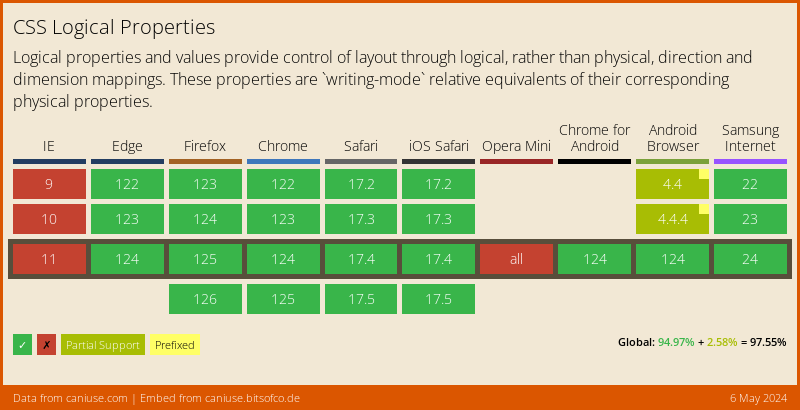PostCSS Logical Properties and Values lets you use logical, rather than physical, direction and dimension mappings in CSS, following the CSS Logical Properties and Values specification.
.banner {
color: #222222;
inset: logical 0 5px 10px;
padding-inline: 20px 40px;
resize: block;
transition: color 200ms;
}
/* becomes */
.banner:dir(ltr) {
padding-left: 20px; padding-right: 40px;
}
.banner:dir(rtl) {
padding-right: 20px; padding-left: 40px;
}
.banner {
resize: vertical;
transition: color 200ms;
}
/* or, when used with { dir: 'ltr' } */
.banner {
color: #222222;
top: 0; left: 5px; bottom: 10px; right: 5px;
padding-left: 20px; padding-right: 40px;
resize: vertical;
transition: color 200ms;
}
/* or, when used with { preserve: true } */
.banner:dir(ltr) {
padding-left: 20px; padding-right: 40px;
}
.banner:dir(rtl) {
padding-right: 20px; padding-left: 40px;
}
.banner {
color: #222222;
top: 0; left: 5px; bottom: 10px; right: 5px;
inset: logical 0 5px 10px;
padding-inline: 20px 40px;
resize: block;
resize: vertical;
transition: color 200ms;
}These shorthand properties set values for physical properties by default.
Specifying the logical keyboard at the beginning of the property value will
transform the flow-relative values afterward into both physical LTR and RTL
properties:
border,border-block,border-block-start,border-block-end,border-inline,border-inline-start,border-inline-end,border-start,border-end,border-color,border-block-color,border-block-start-color,border-block-end-color,border-inline-color,border-inline-start-color,border-inline-end-color,border-start-color,border-end-color,border-style,border-block-style,border-block-start-style,border-block-end-style,border-inline-style,border-inline-start-style,border-inline-end-style,border-start-style,border-end-style,border-width,border-block-width,border-block-start-width,border-block-end-width,border-inline-width,border-inline-start-width,border-inline-end-width,border-start-width,border-end-width,border-start-start-radius,border-start-end-radius,border-end-start-radius,border-end-end-radius
inset,inset-block,inset-block-start,inset-block-end,inset-inline,inset-inline-start,inset-inline-end,inset-start,inset-end
margin,margin-block,margin-block-start,margin-block-end,margin-inline,margin-inline-start,margin-inline-end,margin-start,margin-end
padding,padding-block,padding-block-start,padding-block-end,padding-inline,padding-inline-start,padding-inline-end,padding-start,padding-end
block-size,max-block-size,min-block-size,inline-size,max-inline-size,min-inline-size
clear: inline-start,clear: inline-end,float: inline-start,float: inline-end,text-align: start,text-align: end
By default, PostCSS Logical Properties and Values creates fallback selectors
which require at least one [dir] attribute in your HTML. If you don’t have
any [dir] attributes, consider using the following JavaScript:
// force at least one dir attribute (this can run at any time)
document.documentElement.dir=document.documentElement.dir||'ltr';Otherwise, consider using the dir option to transform all logical properties
and values to a specific direction.
require('postcss-logical')({
dir: 'ltr'
});Add PostCSS Logical Properties and Values to your project:
npm install postcss-logical --save-devUse PostCSS Logical Properties and Values to process your CSS:
const postcssLogical = require('postcss-logical');
postcssLogical.process(YOUR_CSS /*, processOptions, pluginOptions */);Or use it as a PostCSS plugin:
const postcss = require('postcss');
const postcssLogical = require('postcss-logical');
postcss([
postcssLogical(/* pluginOptions */)
]).process(YOUR_CSS /*, processOptions */);PostCSS Logical Properties and Values runs in all Node environments, with special instructions for:
| Node | PostCSS CLI | Webpack | Create React App | Gulp | Grunt |
|---|
The dir option determines how directional fallbacks should be added to CSS.
By default, fallbacks replace the logical declaration with nested :dir
pseudo-classes. If dir is defined as ltr or rtl then only the left or
right directional fallbacks will replace the logical declarations. If
preserve is defined as true, then the dir option will be ignored.
The preserve option determines whether directional fallbacks should be added
before logical declarations without replacing them. By default, directional
fallbacks replace logical declaration. If preserve is defined as true, then
the dir option will be ignored.


